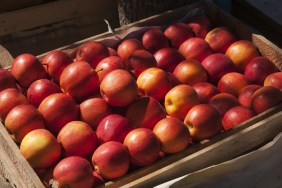It’s no secret that eating a variety of fruits and vegetables on a daily basis is one of the keys to a healthy body, great skin, strong nails and a host of other positive attributes, but few people pay enough attention to eating what’s in season. Not only will eating in season benefit your health, it’s beneficial for budgets and will make it more likely that you’ll stick to eating healthfully (because in-season produce tends to be more flavorful than say…peaches in December). Ideally, we’d all be buying organic, but if you don’t have access to pesticide-free produce or are on a tight budget, opt for ones known to have the fewest trace pesticides (marked with an asterisk below).
Here’s a look at some of what’s in season for summer and why you should be eating it.
Kiwi*
Rich in vitamin C, kiwis are known to help treat lung problems including shortness of breath, asthma and coughs. They’re also rich in vitamin E, magnesium, potassium and copper, all of which work to protect the cardiovascular system.
Pineapple*
They are loaded with immune-boosting vitamins and ones that help regulate blood sugar and aid the body in metabolizing fats and protein like vitamin C, manganese and vitamin B.
Avocado*

Mango*
High in glutamine acid which is good for boosting memory and keeping cells active, mangoes are also high in iron, which is especially important for women who tend to run low on this crucial mineral. Bodies low in iron tend to experience dizziness, fatigue, pale skin, low energy and frequent headaches.
Grapefruit*
A good source of vitamin C, potassium, lycopene, calcium, fiber and phosphorous, it also contains bioflavonoid and other plant chemicals, which helps protect against various cancers and heart diseases.
Spring onions*
High in vitamin K and A, spring onions are known to help lower blood sugar levels, help treat gastrointestinal problems, alleviate cold symptoms and speed up the level of blood circulation in the body.
Morels*
These spongy wild mushrooms provide antioxidants that protect healthy cells from disease formation, macronutrients beneficial for heart health, and they’re thought to help improve liver function.
Spinach
Rich in flavonoids, which help fight cancer, spinach also contains a variety of anti-inflammatory agents. The high amount of vitamin A in spinach also promotes healthy skin.
Radishes
High in fiber and vitamin C, radishes also contain a group of compounds called isothiocyanates, which have been shown to be effective cancer fighters.
Rhubarb
Though it’s a vegetable, it’s usually used as a fruit for dessert and makes for a good source of vitamin C, potassium and manganese. That said, if you aren’t a fan of tart flavors, you might want to stay away from rhubarb as it will require a lot of sugar, which may negate some of its health benefits.
Beet
Known as one of nature’s aphrodisiacs, beets contain high amounts of boron, which is related to the production of human sex hormones. Beets are also particularly beneficial to women who are pregnant because they’re a rich source of vitamin B and iron, which help with the growth of cells during pregnancy.







